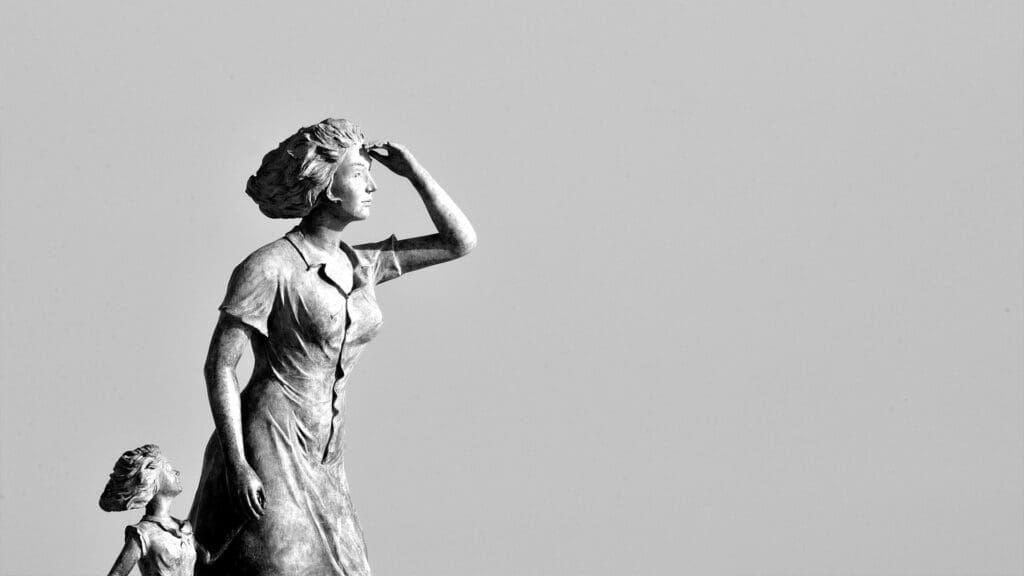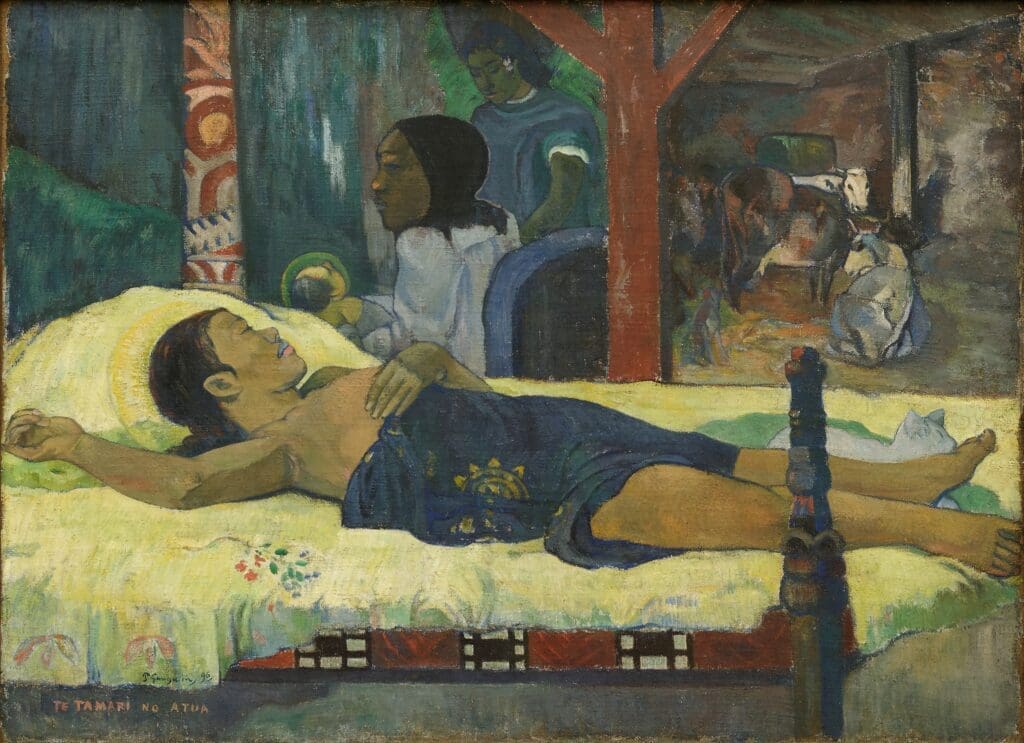I
It’s 10:00 p.m. and I must wake up at 4:00 a.m. Suddenly, in the dark I feel my daughters climbing into bed. They know I’m about to travel and are craving as much physical closeness as they can get. As they snuggle up, I find myself weighed down by my children, neither of whom understands their mother’s need for personal space in order to sleep. As I lie here, choosing not to count each precious minute of lost sleep, I consider how heavy my girls have become as they’ve grown. With one on my right and one on my left doing their best impressions of sandbags, I delight in their weight. Come morning, I will wing my way halfway across the country at twenty thousand feet. But in the middle of this night, their combined ninety pounds is life’s sweet reminder of what holds me to my place.
—
One summer while home from college, I discovered the myth of Icarus in a little Greek restaurant downtown. Christos, the owner, spouted a lot of legends, like the one about his “Onassis cake” and how he had been Jacki O.’s personal chef. But a more ancient variety hung on the restaurant’s back wall in the shape of a plaster relief of Icarus. His broken, melting wings filled the frame; there was something about the tale of an imprisoned young man’s failure to escape because he flew too close to the sun that captivated me.
When I was young, I went through life and the world seeking terrifying heights—the steep ascent of youthful rapture, heady moments of being near the sun. I could draw on all my power and leap with unfurled wings to great heights of ambition, creation, and will. Whether it was moving halfway around the world, pouring myself into writing projects, or winning recognition in my work, the only real boundary to my pursuits was myself. Vitality coursed through my being as my inner self looked down on the world.
And then I had children.
Despite my many experiences testing my wings throughout my twenties, I didn’t figure out “what I want to be when I grow up” until I turned thirty. It felt like I finally figured out how to fly at the same time as my biological clock started ticking. When we decided to try to get pregnant, my husband was shocked to hear me describe it as “self-immolation.” I thought that by having kids my ability to soar toward the sun would end. The heat and fire of motherhood would melt away my wings and leave me grounded for good. And truth be told, there were many times in my daughters’ early years when this seemed to be the case.
In The Unbearable Lightness of Being, Milan Kundera asks,
Kundera positions lightness and weightiness as an existential either-or. Ultimately, his final answer amounts to nothing more than a shrug. The novel ends without providing a more definitive answer than that “the lightness/weight opposition is the most mysterious, most ambiguous of all” life’s questions, a dichotomy baked into being itself.
For a long time, I bought into Kundera’s dichotomy. I believed that by taking on the weight of motherhood, I would lose my wings and crash to the earth. Instead, I’ve learned that weight in itself is not what causes something to crash. Nor need it prevent liftoff. Sometimes it’s simply the ballast in your wings.
—
These are questions women across North America are struggling with, as the response to Greta Gerwig’s film Barbie shows. Barbie’s toy existence is weightless, infinitely light. Barbieland is limitlessly buoyant—aesthetically, emotionally, and even physically, as we watch dolls fly through the air. In the contrasting, human world, America Ferrera’s Gloria depicts the heaviness of motherhood and the gravity of its many burdens. As the story unfolds, Barbie learns that to have real life, she must follow Gloria into the weightiness of human existence.
In the film’s dénouement, the themes of lightness and weight converge in Barbie’s visit to the gynecologist. I suppose it’s possible that the simple implication is that, as a living woman, it’s best practice for Barbie to get her regular Pap smear. But after two hours of switching between Gloria’s weighty world of motherhood and Barbie’s weightless world of play, I’m pretty sure Gerwig is making a pronouncement on the meaning of womanhood. Barbie is solidifying her place in the world by pursuing the same weightiness she so admires in Gloria—motherhood.
This is a bold statement coming from a twenty-first-century feminist. It reminds me of Ursula Le Guin’s essay “The Fisherwoman’s Daughter,” in which she rejects the dichotomy given to women—books or babies. She claims that twentieth-century feminism’s embrace of books (a.k.a. woman’s creative abilities) in rejection of babies (a.k.a. woman’s procreative abilities) only furthers what is at heart a patriarchal divide. Men have insisted that the artist, the hero, must create in isolation at the cost of family. When women follow suit, they adopt a masculine ideal and diminish the full expression of themselves, their sexuality, and the very source of their creative powers.
Le Guin examines the long history of women writing and concludes that though it would be nice, and maybe even preferable, to have a “room of one’s own,” many women have seemingly found the kitchen table—chaos, noise, and children included—to be a source of creative power. Le Guin recounts one notable writer’s statement that her “writing profited, from the difficult, obscure, chancy connection between the art work and the emotional/manual/managerial complex of skills and tasks called ‘housework.’”
The weight of our children’s lives on us can in fact unleash a potency that makes our work, our creativity, our very selves more real.
Le Guin shares a reflection from German artist Käthe Kollwitz. Kollwitz muses on years trying to paint while minding her young children and the ways her creativity changed after her children left the home. She observes, “Perhaps in reality I accomplish a little more. The hands work and work, and the head imagines it’s producing God knows what, and yet, formerly, when my working time was so wretchedly limited, I was more productive, because I was more sensual; I lived as a human being must live, passionately interested in everything. . . . Potency, potency is diminishing.”
Potency. Children are indeed weights for women. But, as so many creatives have discovered, the weight of our children’s lives on us can in fact unleash a potency that makes our work, our creativity, our very selves more real. This is why Gerwig ends her film with Barbie’s pursuit of motherhood.
As Le Guin writes, “This potency felt by a woman is a potency from which the Hero-Artist has (and I choose my words carefully) cut himself off, in an egoism that is ultimately sterile. But it is a potency that has been denied by women as well as men, and not just women eager to collude with misogyny.” Ultimately, she concludes, “To have and bring up kids is to be about as immersed in life as one can be, but it does not always follow that one drowns. A lot of us can swim.”
—
In 1864 George MacDonald published a fairy tale about humanity’s need for that which weighs us down. In his delightful story The Light Princess, the titular character has no gravity; she floats and is unable to keep her feet on the ground. Swimming is her one solace, for water mitigates her lack of gravity.
MacDonald’s gravity-less princess ceasing to float through life parallels Gerwig’s ephemeral toy gaining personhood, but there is a crucial difference. Barbie’s path to personhood is an act of self-creation. Barbie must eschew her relational entanglements, particularly with men, to establish her reality. Procreation is not the result of relationship but rather a choice of individualistic self-expression. Ken has no role to play in Barbie becoming a person. In MacDonald’s tale, however, the princess can only find gravity through a messily ravelled relationship with the prince. Her newfound weight is purchased through the self-sacrificial love of another. First the prince sacrifices his life to give the princess a future, which leads her to save him in return.
For some women, particularly those who grew up around healthy marriages and positive male figures, MacDonald’s relational vision makes the most sense. But many women live with histories that make Gerwig’s vision of individualistic motherhood deeply appealing. Even MacDonald nods to the pain newfound gravity might contain:
“My darling child! She’s found her gravity!”
“Oh that’s it! Is it?” said the princess, rubbing her shoulder and her knee alternately. “I consider it very unpleasant. I feel as if I should be crushed to pieces.”
MacDonald’s princess eventually adapts to the feeling of gravity, embarking on a happily ever after. But who among us has not at times felt as if the weight of the men in our lives might not be more overwhelming, more crushing, than the weight of our children? Even in the best marriages, there are moments of real doubt wherein a woman finds herself asking whether going it alone might not be the more sane and self-preserving route.
Some may look at Gerwig’s individualistic vision and see selfishness. Without denying that possibility, I mostly see defensiveness; it’s not an illogical response when women so often feel like those who promise to help us fly instead pin us to the ground, treading on the wings we’ve so carefully crafted for ourselves.
In one of her most beautiful songs, Beyoncé sings to her child, “I first saw your face in your father’s gaze.” This line runs on loop through my mind. It’s an incredible description of the relational dynamism MacDonald relies on to give his princess weight. But what if that gaze is menacing rather than benevolent? In a world where women are no longer socially or legally bound to procreation through a male progenitor, and where the impulse to defend the self is often the strongest, we must ask ourselves: For what reason should we embrace MacDonald’s rather than Gerwig’s vision for gaining the weightiness of true humanity?
—
Women want to escape that which imprisons us. The human condition is mired in feelings of brokenness, entrapment, failure. We want to reach the great heights of life. We want to be near the sun, and so we strive to make ourselves buoyant with the wings of self-made identity. But all the sages eventually discover humanity’s need for weightiness to soar.
But what if, like Icarus, our most fundamental problem remains with our wings themselves? Whether it’s Gerwig’s vision of individualistic self-creation or MacDonald’s vision of relational dynamism, perhaps the real problem is that we take on the work of constructing wings for ourselves to begin with. Perhaps our best creations will only ever melt when too close to the sun.
What we want are wings, heavy solid ones that do not melt as they carry us to heaven. But where can they be found?
My first child was born between defending my master’s thesis and walking to receive my diploma. I loved every single moment of my program, and the nine months I spent writing a thesis while pregnant were the best. Then the baby came. As if the newfound weight of motherhood weren’t challenging enough, my husband was in a doctoral program of his own at Harvard. I took a full-time job that I believed in and seemed genuinely enjoyable, but it was not a job that seemed destined to fly me to the sun. Not long after, we had a second child.
So many of my days during those years of having babies while supporting my husband through graduate school felt truly, horrifically crushing. But along with Le Guin, I felt a potency growing from the messiness and chaos of the kitchen table. Both within and outside my weekday job, I pursued faithful stewardship of my gifts and talents, and to my complete and utter shock, the years of intense family pressure somehow became years of incredible creative output. In short, the weight I took on in those years didn’t lead to self-immolation. They led to liftoff.
I’m not here to tell you what I accomplished or how, because that is not the point. Every woman is different—the time, energy, and capacity we have vary, and so too should the results. But I can tell you what enabled me to stay alive on the days when my children drained me of all energy, or when I doubted the value of my student-husband. It wasn’t having adequate child care; it wasn’t a perfect division of household labour; it wasn’t having a husband who believed in me (though, of course, those do matter).
My womanhood is part of a reality that is far more embodied, intertwined, relational, dependent, and mutually weighty than what the world tells me it can and should be.
What has enabled me to see flight not as a solo project but as a group endeavour is my belief in a God who tells me that I am most human when I am relational.
Weight. Light. Wings. Glory. Eventually all metaphors fall apart. But in this world where children are often no more than a question of the mother’s path toward self-realization and husbands are no more than optional companions, the historic gospel of Jesus Christ insists that my womanhood is part of a reality that is far more embodied, intertwined, relational, dependent, and mutually weighty than what the world tells me it can and should be.
And that reality starts with how we get our wings in the first place. According to the Christian Scriptures, to fly at all requires dependence on another. I cannot construct wings for myself; I must have them given to me.
C.S. Lewis writes, “To please God . . . to be a real ingredient in the divine happiness . . . to be loved by God, not merely pitied, but delighted in as an artist delights in his work or a father in a son—it seems impossible, a weight or burden of glory which our thoughts can hardly sustain. But so it is.”
For God to love us is indeed a seemingly impossible weight, one that causes us to be buried with Jesus. Our self-righteousness, our self-sufficiency, our self-defining cannot be sustained under the gaze of God. It crushes us. But as we die with him, so we rise with him. We no longer need to build our own wings. His wings become ours, and we ascend.
In Malachi 4:2 God declares to us, “But for you who fear my name, the sun of righteousness shall rise with healing in its wings.” The bad news is that we can’t find or create or produce our own wings. The good news is that Jesus Christ carries us on his. As the great carol proclaims,
Hail the Sun of righteousness!
Light and life to all He brings,
Ris’n with healing in His wings:
Mild He lays His glory by,
Born that man no more may die;
Born to raise the sons of earth;
Born to give them second birth.
And unlike Icarus’s solo flight, our ascension on the wings of Jesus is inherently communal—far more so than even MacDonald’s vision of weight attained through man and woman. Glory—being near the sun—and its attainment aren’t about me at all. They are about the entirety of redeemed humanity rising together with Jesus.
My children give me weight so that I have ballast with which to fly. My husband sacrifices for me regularly so that I can stay grounded. But it doesn’t stop there. My parents raised me in my youth so that I could learn to fly from their home. My best friend pins me to my past. My church shoulders my burdens when they are too heavy. And I am reciprocally each of these things to all these people in return. God knits us together as we ascend.
—
My sister recently texted the family group chat with an SOS. She had been offered a last-minute career opportunity that would require her absence from the home every weeknight for a stretch. “It’s a bit frustrating to have these opportunities I’ve been waiting for at the point in my life where things are most hands-on at home,” she wrote.
My brother and I chimed in that the same thing happened to us—opportunity arrived at the very moment we became parents. But we didn’t jump in with a lot of dos and don’ts. She is learning for herself the benefits of the additional weight she now shoulders, and that it doesn’t exist for her own self-discovery or self-fulfillment. As she wrestles with her decisions, she knows that her children don’t exist for her, nor she for her children. They exist within a bigger, better family.
One day, my daughters will grow and possibly take on themselves the weight of motherhood. My husband and I are always careful to say “if,” not “when,” they have children. There are many choices before them that will in part determine this outcome, and there may be many limitations on their lives beyond what they can choose.
But even if they do not become mothers, my prayer is that they will receive that which weighs them down, which provides them with ballast. I’m certain it will be relational. I’m certain it will feel inconvenient. And I’m certain that whatever it may be, it will feel a lot like mothering.






